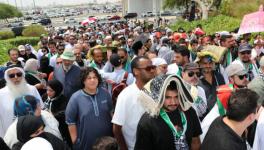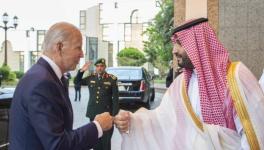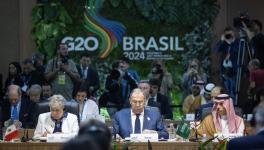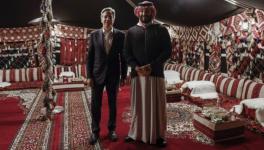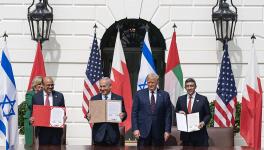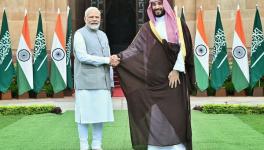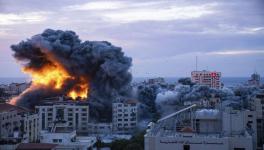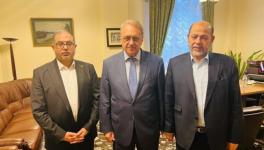Why Libya Is a Mayhem State
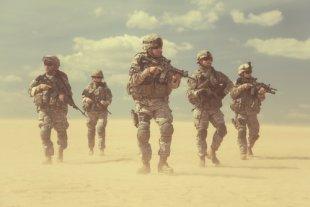
Photo Credit: Getmilitaryphotos/Shutterstock
On October 14, a former Prime Minister of Libya – Khalifa al-Ghwell – gathered some supporters at the Rixos Hotel in Tripoli and announced that he was the new head of government. It was a curious moment for this former engineer from the city of Misrata – the hotbed of the anti-Qaddafi uprising in 2011. Various militia outfits that support al-Ghwell surrounded the Rixos, but did not have the capacity to seize the main institutions of the country. It was more like a press conference than a declaration of a coup.
Amongst the gaggle of press were representatives of the television channel – Tanashah TV. This television channel is associated with the grand mufti Sadiq al-Ghariani who heads the Dar-al-Ifta (The Fatwa Council), Libya’s leading religious authority. It is said that al-Ghariani backed this ‘coup’ by al-Ghwell because both are in agreement that the United Nations-backed government should not be given legitimacy.
As it turned out, the ‘coup’ fizzled out and al-Ghwell went into hiding. He has enough muscle behind him to protect himself from the UN-backed government. That muscle is angry at the central government because they say that they have not been paid their salaries. For the militia fighters, it often comes down to material issues. Al-Ghwell and al-Ghariani, on the other hand, have more elevated grievances.
The European Union and the United States government had placed al-Ghwell on a sanctions regime earlier this year because he has publically refused to support the UN-backed government. He is not the only one.
In the east of the country, General Khalifa Haftar – a former Gaddafi-era general who defected to live for twenty-four years in the shadow of the CIA headquarters – leads the Libyan National Army. This is not the official army, for Libya, in essence, does not have a national army. It is Haftar’s militia, backed fully by various regional powers, and it has conducted its own war against Islamist groups in Benghazi and elsewhere. Haftar is not keen on the UN-backed government. But neither are his opponents in Benghazi, such as the Benghazi Revolutionary Shura Council (BRSC) and ISIS.
Militia groups across the fragmented landscape of Libya have conflicted relationships with the Government of National Accord (GNA), the UN-backed entity. Misrata’s most powerful politician – Ahmed Maiteeq – has thrown in his lot with the GNA. This is why its important fighting units – Katibat Halbous and Liwa al-Mahjoub – are now pledged to defend the government. However, even within Misrata, the legions of Libyan Dawn – led by the erratic Salah Badi – despise the GNA and have a tacit alliance with al-Ghwell. Each town – from Tripoli to Zintan – has divided loyalties, with some groups for the GNA, others against it, and with yet others utterly invested in their own pathways to power and prosperity. Inside Tripoli, for example, Haitham al-Tajouri, who had helped foil the coup of 2013, runs the Tripoli Revolutionaries’ Brigade, which is largely self-serving – a mafia entity as far as ordinary people are concerned.
No one has a monopoly over violence. In fact, violence has a monopoly over Libya. It is dangerous to move from one town to another, indeed from within a town itself. Rival militia groups hold different parts of towns and regions, with checkpoints set up to mark boundaries. The political character of each militia group is easy to fathom, but what is less easy is to understand is how these various groups could be disarmed and brought into the political process. Awash with guns, politics is now intimidation and threat. Serious military operations remain underway in Benghazi and in several of the central Libyan towns. Days before the failed coup in Tripoli, gunmen toured the city and conducted skirmishes with each other. For most Libyans, ISIS – which had controlled Sirte – is the least of their problems. They are confronted by economic distress and by political violence. It is a toxic situation.
The Oil Prize
Libya is one of the most important oil countries, and yet since the NATO war of 2011 it has not been able to sell its oil. Reliant upon oil revenues, Libya has faced great challenges. A World Bank study team finds that as a result of poor oil production, ‘the economy has remained mired in recession since 2013, with GDP shrinking by an estimated 8.3 percent in 2016.’ GDP per capita, meaning the money in people’s pockets, has shrunk by two-thirds of its pre-NATO war levels.
Despite the appearance of the UN-brokered Government of National Accord, several political centers remain in Libya. There is the Presidential Council, led by Fayez al-Serraj; this is the UN-backed GNA, which is based in Tripoli. There is the House of Representatives, based in Tobruk, and there is the government of Abdullah al-Thinni, based in al-Bayda, neither of which have given their fealty to the Presidential Council. General Khalifa Haftar commands the loyalty of the House of Representatives and the government of al-Thinni. He is in no mood to concede to the UN process.
One of the reasons why Haftar is reticent is that he controls large parts Libyan oil, most notably in the ‘oil crescent’ from Az-Zuwaytinah to Marsa al-Brega outwards to Ras Lanuf and As Sidr. Haftar has now taken the main oil sources and ports into the camp of the governments in Tobruk and al-Bayda. His forces routed the Petroleum Guards, whose leader Ibrahim Jadran had cut a deal with the United Nations to bring the fields and ports under the control of the UN-backed Presidential Council. Whether Jadran will be able to counter Haftar is to be seen (incidentally, Jadran’s brother is a member of ISIS, and there is always the suggestion that a weak Jadran might throw in his chips with a weakened ISIS).
What oil wealth comes into the various exchequers does not make its way into the hands of the public. A scathing Libyan Audit Bureau report from 2014 showed that corruption had become endemic in the country. Money seemed to be spent, but no infrastructure could be seen. It is this utter economic failure and political insecurity that has led to a Qaddafi-nostalgia. Old friends who carried no water for Qaddafi now say that they regret the NATO war of 2011. Qaddafi supporters from the old days – who hide their politics for fear of assassination – say that they were right to stand with the old regime. It is a miserable situation.
Saudi Arabia
One of the root causes of the chaos in Libya is that it became – after 2012 – a playground for regional ambitions. Turkey and Qatar backed their Muslim Brotherhood allies, while Saudi Arabia, the UAE and Egypt offered their support to others. Western powers also had their favorites, many of them people of the Libyan diaspora who had shallow roots in the country. Libyans had little space to develop their own politics. Between the guns and the foreign influence, Libya suffers greatly.
Saudi Arabia had the advantage of older networks inside Libya. When Qaddafi was cleaning up the Libyan Islamic Fighting Group (LIFG) – a terrorist network of the 1990s – he asked the Kingdom of Saudi Arabia to send sheikhs to re-educate the LIFG fighters. The views of a Saudi cleric – Sheikh al-Islam Rabee’ bin Hadi al-Madkhali – were promoted inside Libya. Sheikh al-Madkhali took the view that pious Muslims must adhere to the person in power (wali al-amr). This was an approach that the Saudis liked inside the kingdom. Qaddafi was happy to promote such views. Of course, this meant that Saudi sheikhs now got to promote their views in opposition to Libya’s cult of saints and sufis and against the kind of political Islam of both the Muslim Brotherhood and the LIFG. After the NATO war, tensions between Saudi Arabia and Qatar tore through Libya – with the various Saudi supporters going after the Muslim Brotherhood. That ‘war’ is now over, although remnants of it remain.
Across the country, from Tripoli to al-Bayda, the Saudi influenced clerics and groups remain strong and are getting stronger. Tripoli’s Abd al-Rauf Kara and his Special Deterrence Force (previously the Nawasi Battalion) is one flank of the Saudi-backed fighters, while another sits in wait inside Haftar’s Libyan National Army as well as in Haftar’s Benghazi enemy – Ansar al-Sharia. Their politics is as virulent as that of ISIS – although they are not keen to demonstrate this in public at this time. For now Kara’s troops battle ISIS, which one more piece of the confusion inside Libya. No one seems to understand Saudi Arabia’s long-term project for Libya.
Fear and Fecklessness
When al-Ghwell tried to conduct his failed coup, the leader of the UN-backed GNA – Fayez al-Serraj – was nonchalant. He remained in Tripoli, going to see a police graduation ceremony and then the hospital at Abu Salim. It was as if the coup had not happened.
Hastily the various militias close to the government condemned the coup. Al-Ghwell had read the tea leaves correctly when he saw that support for the UN-backed government is limited, but he had read them incorrectly when he thought he would be the symbol of unity. It was not so. Last year, al-Ghwell told al-Hayat that he wanted Saudi Arabia to play a greater role in Libya. It was a sign of his affections. Neither Saudi Arabia nor any other regional power gave him support. He had to vanish into the cocoon of his militias.
Attorney General Siddiq al-Sur said that the coup plotters must be arrested and tried. When his boss – Fayez al-Serraj – was at the UN in September he said, ‘We have no choice but dialogue and reconciliation. No one wants an escalation of confrontation between Libyans.’ This sentence sounds very fine in the halls of the United Nations. It is far from reality. It is precisely confrontation that sets the scene in Libya – this is the outcome of the NATO war of 2011, pushed by the French and by US Secretary of State Hillary Clinton. It is what the Libyans inside the country have to live through.
Disclaimer: The views expressed here are the author's personal views, and do not necessarily represent the views of Newsclick
Get the latest reports & analysis with people's perspective on Protests, movements & deep analytical videos, discussions of the current affairs in your Telegram app. Subscribe to NewsClick's Telegram channel & get Real-Time updates on stories, as they get published on our website.









